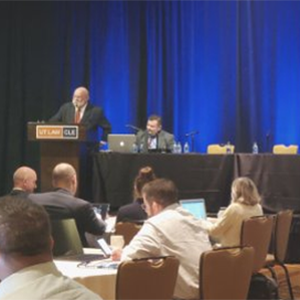
eCourse
Offerings Updates: Reg. A & D Updates; How to Do a Texas Public Offering; plus Crowdfunding
Contains material from Mar 2015
It is better in an ecourse to have slides that correlate with the presentation.
Technical Questions?
512.475.6700
service@utcle.org
Session 2: How to Do a Texas Public Offering - In order for a Texas issuer to use Reg. A and its provisions which allow for testing the waters and communicating with potential investors, that issuer must pair Reg. A with a Texas public offering. Until the offering limit for Reg. A was raised to $50 million by the JOBS Act, we saw very few Reg. A offerings in Texas. At the same time, while state registration was originally required whenever an issuer initiated a federally-registered offering, that is no longer the case. Since 1996, Congress has preempted state securities law in a number of areas, including public offerings where issuers become listed on an exchange. Consequently, a generation of Texas lawyers has not done a Texas public offering. Become reacquainted with the requirements of this type of offering which may soon become more widely used.
Session 3: Crowdfunding - Crowdfunding has captured the imagination of entrepreneurs. In 2012, the JOBS Act required the SEC to create an exemptive rule to cover crowdfunding offerings. While the SEC has proposed rulemaking and has sought comment on its proposal, it has not issued final regulations (as of press time) and many believe the proposed regulation is too cumbersome. Twelve states, including Texas, have proposed or enacted their own intrastate crowdfunding rules and are looking to coordinate their efforts through NASAA. What is the current crowdfunding landscape and what is needed to create effective regulation in this area? What tools are available for you to use now?
Includes: Audio Paper Slides
Preview Sessions
Show session details
Gerald J. Laporte, Faith L. Anderson, Marty Dunn
Download session materials for offline use
Session 1 —61 mins
Non-Registered Offerings: Updates on Regulation D and Regulation A (Mar 2015)
Updates on the requirements of Rule 506(b) and (c); Reg. A and Reg. A+, as well as opportunities for resales. How are issuers using the new tools? What is on the regulatory horizon for issuers in non-registered offerings?
Originally presented: Feb 2015 Securities Regulation and Business Law
Gerald J. Laporte,
Securities Regulation Consultant, Former Chief, Office of Small Business Policy, U.S. Securities and Exchange Commission - Arlington, VA
Faith L. Anderson,
Washington Department of Financial Institutions, Securities Division - Olympia, WA
Marty Dunn,
Morrison & Foerster LLP - Washington, DC
Show session details
Ryan R. Cox, Nick Bhargava, Patricia Loutherback
Session 2 —60 mins
How to Do a Texas Public Offering (Mar 2015)
In order for a Texas issuer to use Reg. A and its provisions which allow for testing the waters and communicating with potential investors, that issuer must pair Reg. A with a Texas public offering. Until the offering limit for Reg. A was raised to $50 million by the JOBS Act, we saw very few Reg. A offerings in Texas. At the same time, while state registration was originally required whenever an issuer initiated a federally-registered offering, that is no longer the case. Since 1996, Congress has preempted state securities law in a number of areas, including public offerings where issuers become listed on an exchange. Consequently, a generation of Texas lawyers has not done a Texas public offering. Become reacquainted with the requirements of this type of offering which may soon become more widely used.
Originally presented: Feb 2015 Securities Regulation and Business Law
Ryan R. Cox,
Haynes and Boone, LLP - Dallas, TX
Nick Bhargava,
GROUNDFLOOR - Atlanta, GA
Patricia Loutherback,
Texas State Securities Board - Austin, TX
Show session details
John Morgan, Bjorn J. Hall, Marty Dunn
Session 3 —45 mins
Crowdfunding (Mar 2015)
Crowdfunding has captured the imagination of entrepreneurs. In 2012, the JOBS Act required the SEC to create an exemptive rule to cover crowdfunding offerings. While the SEC has proposed rulemaking and has sought comment on its proposal, it has not issued final regulations (as of press time) and many believe the proposed regulation is too cumbersome. Twelve states, including Texas, have proposed or enacted their own intrastate crowdfunding rules and are looking to coordinate their efforts through NASAA. What is the current crowdfunding landscape and what is needed to create effective regulation in this area? What tools are available for you to use now?
Originally presented: Feb 2015 Securities Regulation and Business Law
John Morgan,
Securities Commissioner, Texas State Securities Board - Austin, TX
Bjorn J. Hall,
General Counsel, Fundrise - Washington, DC
Marty Dunn,
Morrison & Foerster LLP - Washington, DC